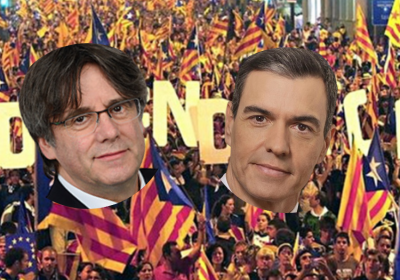After two days of debate, the Spanish congress invested the second-term government led by prime minister Pedro Sánchez on November 16, following a deal between the Spanish Socialist Workers Party and Together for Catalonia (Junts), reports Dick Nichols.
Catalonia
By releasing the Catalans leaders, the Spanish government is hoping to rebuild bridges with those alienated by their imprisonment, even as it insists on the impossibility of having a indepedence referendum, writes Dick Nichols.
Following Catalonia's February 14 election, writes Dick Nichols, pro-independence parties will need to find an agreed path to force the Spanish government to meet the demands of Catalans for amnesty and an independence referendum.
The upcoming Catalan election will be a test of the resilience of the pro-independence base, impacted by the COVID-19 pandemic, Spanish state repression and attempts by Catalan counterparts of the governing coalition in Madrid to claw back support, writes Dick Nichols.
Whenever supporters of Catalan sovereignty and independence have been asked to travel far from home to champion their country’s democratic rights, they have always rallied to the cause, writes Dick Nichols from Barcelona.
Capitulation to the Spanish state has blown apart Catalonia's pro-independence alliance and forced an early election, writes Dick Nichols from Barcelona.
Spain’s April 28 general election will be “existential” for the Spanish state, according to outgoing Spanish Socialist Workers Party (PSOE) foreign minister Josep Borrell — the scourge of the Catalan sovereignty movement. It will be a “referendum on the secessionist menace”, according to People’s Party (PP) opposition leader Pablo Casado.
News and analysis on Catalonia's struggle for self-determination from Green Left Weekly's European bureau.
At the June 8 ceremonial handing over of portfolio briefcases from outgoing conservative People’s Party (PP) ministers to their incoming Spanish Socialist Workers’ Party (PSOE) replacements, the contrasts were dramatic.
A bunch of reactionary lifetime political operators and religious obscurantists were replaced by what new Prime Minister Pedro Sánchez boasted was the “progressive”, “feminist” and “Europeanist” alternative.
Thousands of Muslims voiced their rejection of jihadi extremism on August 21, marching through central Barcelona with banners reading “Terrorism has no religion”, Morning Star Online said.
It came in the wake of the August 17 terrorist attacks in Catalonia, which killed 13 and was claimed by Islamic State.
Catalonia’s regional government has declared it will hold a referendum on October 1 over whether it should become independent from Spain. In response, Spain’s conservative People’s Party (PP) Prime Minister Mariano Rajoy has vowed that the “unconstitutional” referendum will not take place, setting the scene for the biggest crisis in the Spanish state since the 1978 transition from the Franco dictatorship.
Quim Arrufat is a joint national spokesperson for the People’s Unity List (CUP), an organisation that he has likened to “urban Zapatistas” – in reference to the insurgent indigenous movement based in Chiapas, Mexico – that is committed to Catalan independence and socialism.
- Page 1
- Next page











